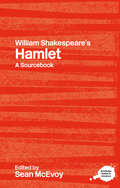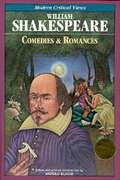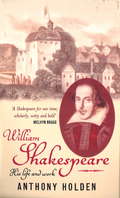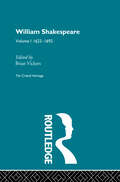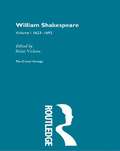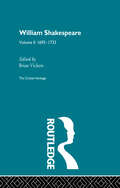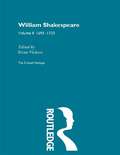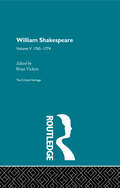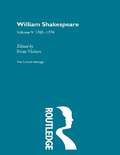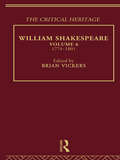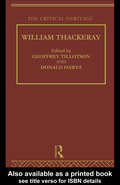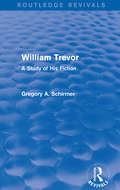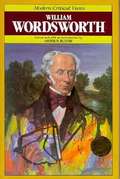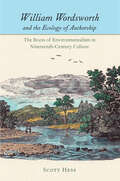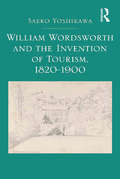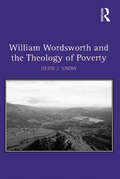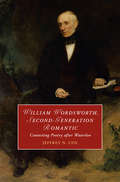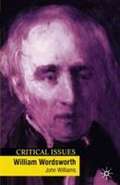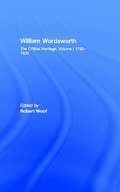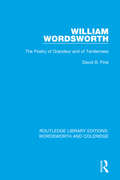- Table View
- List View
William Shakespeare's A Midsummer Night's Dream (Amplify Core Knowledge Language Arts Reader)
by William Shakespeare<P>Unit 7 focuses on Shakespeare’s A Midsummer Nights Dream in the form of a learning quest. <P>The original play is excerpted and is accompanied with summaries of Shakespeare's play. Summaries are in different styles and structures to provide engaging challenges to students.
William Shakespeare's A Midsummer Night's Dream: Activity Book (Amplify Core Knowledge Language Arts, Grade 5 #Unit 7)
by Amplify EducationNIMAC-sourced textbook
William Shakespeare's Hamlet: A Routledge Study Guide and Sourcebook
by Sean McEvoyWilliam Shakespeare's Hamlet (c.1600-1601) has achieved iconic status as one of the most exciting and enigmatic of plays. It has been in almost constant production in Britain and throughout the world since it was first performed, fascinating generations of audiences and critics alike.Taking the form of a sourcebook, this guide to Shakespeare's remarkable play offers:extensive introductory comment on the contexts, critical history and performance of the text, from publication to the presentannotated extracts from key contextual documents, reviews, critical works and the text itselfcross-references between documents and sections of the guide, in order to suggest links between texts, contexts and criticismsuggestions for further reading.
William Shakespeare: Comedies and Romances (Modern Critical Views)
by Harold BloomAn analysis of the comedies and romances of one of the most influential writers in the English-speaking world.
William Shakespeare: His Life and Work
by Anthony HoldenWho was William Shakespeare? How did the 'rude groom' from Stratford grow up to be the greatest poet the world has known? Not for a generation, since the late Anthony Burgess's SHAKESPEARE (1970), has there been anything approaching a popular, mainstream biography of the greatest and most celebrated writer. Yet Shakespeare's life was as colourful, varied and dramatic as his works: the Warwickshire country boy who 'disappeared' for seven years before fetching up in London as an apprentice actor...whose fellow players could scarcely keep up with the plays he turned out for them...who rapidly became a favourite at the court of Elizabeth I...and returned to Stratford a prosperous 'gentleman', proud to realise his father's dream of a family coat of arms, before his death at 52.Anthony Holden brilliantly interleaves the poets own words with the known facts to breathe new life into a story never before told in such absorbing detail. 'The perfect blend of erudition and accessibility' - the Daily Telegraph's verdict on Holden's life of Tchaikovsky - applies equally to his revealing, very human portrait of Shakespeare.
William Shakespeare: His Life and Work
by Anthony HoldenWho was William Shakespeare? How did the 'rude groom' from Stratford grow up to be the greatest poet the world has known? Not for a generation, since the late Anthony Burgess's SHAKESPEARE (1970), has there been anything approaching a popular, mainstream biography of the greatest and most celebrated writer. Yet Shakespeare's life was as colourful, varied and dramatic as his works: the Warwickshire country boy who 'disappeared' for seven years before fetching up in London as an apprentice actor...whose fellow players could scarcely keep up with the plays he turned out for them...who rapidly became a favourite at the court of Elizabeth I...and returned to Stratford a prosperous 'gentleman', proud to realise his father's dream of a family coat of arms, before his death at 52.Anthony Holden brilliantly interleaves the poets own words with the known facts to breathe new life into a story never before told in such absorbing detail. 'The perfect blend of erudition and accessibility' - the Daily Telegraph's verdict on Holden's life of Tchaikovsky - applies equally to his revealing, very human portrait of Shakespeare.
William Shakespeare: The Critical Heritage Volume 1 1623-1692
by Brian VickersThe Critical Heritage gathers together a large body of critical sources on major figures in literature. Each volume presents contemporary responses to a writer's work, enabling students and researchers to read for themselves, for example, comments on early performances of Shakespeare's plays, or reactions to the first publication of Jane Austen's novels. The carefully selected sources range from landmark essays in the history of criticism to journalism and contemporary opinion, and little published documentary material such as letters and diaries. Significant pieces of criticism from later periods are also included, in order to demonstrate the fluctuations in an author's reputation. Each volume contains an introduction to the writer's published works, a selected bibliography, and an index of works, authors and subjects. The Collected Critical Heritage set will be available as a set of 68 volumes and the series will also be available in mini sets selected by period (in slipcase boxes) and as individual volumes.
William Shakespeare: The Critical Heritage Volume 1 1623-1692 (Critical Heritage Ser.)
by Brian VickersThe Critical Heritage gathers together a large body of critical sources on major figures in literature. Each volume presents contemporary responses to a writer's work, enabling students and researchers to read for themselves, for example, comments on early performances of Shakespeare's plays, or reactions to the first publication of Jane Austen's novels. The carefully selected sources range from landmark essays in the history of criticism to journalism and contemporary opinion, and little published documentary material such as letters and diaries. Significant pieces of criticism from later periods are also included, in order to demonstrate the fluctuations in an author's reputation. Each volume contains an introduction to the writer's published works, a selected bibliography, and an index of works, authors and subjects. The Collected Critical Heritage set will be available as a set of 68 volumes and the series will also be available in mini sets selected by period (in slipcase boxes) and as individual volumes.
William Shakespeare: The Critical Heritage Volume 2 1693-1733
by Brian VickersThe Critical Heritage gathers together a large body of critical sources on major figures in literature. Each volume presents contemporary responses to a writer's work, enabling students and researchers to read for themselves, for example, comments on early performances of Shakespeare's plays, or reactions to the first publication of Jane Austen's novels. The carefully selected sources range from landmark essays in the history of criticism to journalism and contemporary opinion, and little published documentary material such as letters and diaries. Significant pieces of criticism from later periods are also included, in order to demonstrate the fluctuations in an author's reputation. Each volume contains an introduction to the writer's published works, a selected bibliography, and an index of works, authors and subjects. The Collected Critical Heritage set will be available as a set of 68 volumes and the series will also be available in mini sets selected by period (in slipcase boxes) and as individual volumes.
William Shakespeare: The Critical Heritage Volume 2 1693-1733 (Critical Heritage Ser.)
by Brian VickersThe Critical Heritage gathers together a large body of critical sources on major figures in literature. Each volume presents contemporary responses to a writer's work, enabling students and researchers to read for themselves, for example, comments on early performances of Shakespeare's plays, or reactions to the first publication of Jane Austen's novels. The carefully selected sources range from landmark essays in the history of criticism to journalism and contemporary opinion, and little published documentary material such as letters and diaries. Significant pieces of criticism from later periods are also included, in order to demonstrate the fluctuations in an author's reputation. Each volume contains an introduction to the writer's published works, a selected bibliography, and an index of works, authors and subjects. The Collected Critical Heritage set will be available as a set of 68 volumes and the series will also be available in mini sets selected by period (in slipcase boxes) and as individual volumes.
William Shakespeare: The Critical Heritage Volume 5 1765-1774
by Brian VickersThe Critical Heritage gathers together a large body of critical sources on major figures in literature. Each volume presents contemporary responses to a writer's work, enabling students and researchers to read for themselves, for example, comments on early performances of Shakespeare's plays, or reactions to the first publication of Jane Austen's novels. The carefully selected sources range from landmark essays in the history of criticism to journalism and contemporary opinion, and little published documentary material such as letters and diaries. Significant pieces of criticism from later periods are also included, in order to demonstrate the fluctuations in an author's reputation. Each volume contains an introduction to the writer's published works, a selected bibliography, and an index of works, authors and subjects. The Collected Critical Heritage set will be available as a set of 68 volumes and the series will also be available in mini sets selected by period (in slipcase boxes) and as individual volumes.
William Shakespeare: The Critical Heritage Volume 5 1765-1774 (Critical Heritage Ser.)
by Brian VickersThe Critical Heritage gathers together a large body of critical sources on major figures in literature. Each volume presents contemporary responses to a writer's work, enabling students and researchers to read for themselves, for example, comments on early performances of Shakespeare's plays, or reactions to the first publication of Jane Austen's novels. The carefully selected sources range from landmark essays in the history of criticism to journalism and contemporary opinion, and little published documentary material such as letters and diaries. Significant pieces of criticism from later periods are also included, in order to demonstrate the fluctuations in an author's reputation. Each volume contains an introduction to the writer's published works, a selected bibliography, and an index of works, authors and subjects.The Collected Critical Heritage set will be available as a set of 68 volumes and the series will also be available in mini sets selected by period (in slipcase boxes) and as individual volumes.
William Shakespeare: The Critical Heritage Volume 6 1774-1801 (Critical Heritage Ser.)
by Brian VickersFirst published in 1995. Routledge is an imprint of Taylor & Francis, an informa company.
William Thackeray: The Critical Heritage (Critical Heritage Ser.)
by Geoffrey Tillotson Donald HawesThe Critical Heritage gathers together a large body of critical sources on major figures in literature. Each volume presents contemporary responses to a writer's work, enabling student and researcher to read the material themselves.
William Trevor: A Study of His Fiction (Routledge Revivals)
by Gregory A SchirmerWilliam Trevor is a master of contemporary fiction. He writes with equal authority about the frustrations of life in remote corners of Ireland, and the hollowness of life is prosperous London suburbs. An Anglo-Irishman, Trevor is admired on both sides of the Atlantic, and both sides of the Irish Sea. In William Trevor: A Study of His Fiction, first published in 1990, Gregory Schirmer analyses Trevor’s novels (such as A Standard of Behaviour and Fools of Fortune) and short stories in detail. He argues that Trevor’s writing is important, both in terms of its mastery of fictional techniques and of the profoundly moral vision that informs it. His view of twentieth-century men and women is subtle and complex, generated by the tension between a humanistic faith in compassion and "connection", and an opposing, more realistic assessment of contemporary society as alienated and disconnected.
William Wordsworth (Modern Critical Views)
by Harold Bloom-- Brings together the best criticism on the most widely read poets, novelists, and playwrights<BR>-- Presents complex critical portraits of the most influential writers in the English-speaking world -- from the English medievalists to contemporary writers
William Wordsworth and the Ecology of Authorship: The Roots of Environmentalism in Nineteenth-Century Culture (Under the Sign of Nature)
by Scott HessIn William Wordsworth and the Ecology of Authorship, Scott Hess explores Wordsworth’s defining role in establishing what he designates as "the ecology of authorship": a primarily middle-class, nineteenth-century conception of nature associated with aesthetics, high culture, individualism, and nation. Instead of viewing Wordsworth as an early ecologist, Hess places him within a context that is largely cultural and aesthetic. The supposedly universal Wordsworthian vision of nature, Hess argues, was in this sense specifically male, middle-class, professional, and culturally elite—factors that continue to shape the environmental movement today.
William Wordsworth and the Invention of Tourism, 1820-1900
by Saeko YoshikawaIn her study of the opening of the English Lake District to mass tourism, Saeko Yoshikawa examines William Wordsworth’s role in the rise and development of the region as a popular destination. For the middle classes on holiday, guidebooks not only offered practical information, but they also provided a fresh motive and a new model of appreciation by associating writers with places. The nineteenth century saw the invention of Robert Burns’s and Walter Scott’s Borders, Shakespeare’s Stratford, and the Brontë Country as holiday locales for the middle classes. Investigating the international cult of Wordsworthian tourism, Yoshikawa shows both how Wordsworth’s public celebrity was constructed through the tourist industry and how the cultural identity of the Lake District was influenced by the poet’s presence and works. Informed by extensive archival work, her book provides an original case study of the contributions of Romantic writers to the invention of middle-class tourism and the part guidebooks played in promoting the popular reputations of authors.
William Wordsworth and the Theology of Poverty
by Heidi J. SnowExploring the relationship between poverty and religion in William Wordsworth’s poetry, Heidi J. Snow challenges the traditional view that the poet’s early years were primarily irreligious. She argues that this idea, based on the equation of Christianity with Anglicanism, discounts the richly varied theological landscape of Wordsworth’s youth. Reading Wordsworth’s poetry in the context of the diversity of theological views represented in his milieu, Snow shows that poems like The Excursion reject Anglican orthodoxy in favor of a meld of Quaker, Methodist, and deist theologies. Rather than support a narrative of Wordsworth’s life as a journey from atheism to orthodoxy or even from radicalism to conservatism, therefore, Wordsworth’s body of work consistently makes a case for a sensitive approach to the problem of the poor that relies on a multifaceted theological perspective. To reconstruct the religious context in which Wordsworth wrote in its complexity, Snow makes extensive use of the materials in the record offices of the Lake District and the religious sermons and congregational records for the orthodox Anglican, evangelical Anglican, Methodist, and Quaker congregations. Snow’s depiction of the multiple religious traditions in the Lake District complicates our understanding of Wordsworth’s theological influences and his views on the poor.
William Wordsworth in Context
by Andrew BennettWilliam Wordsworth's poetry responded to the enormous literary, political, cultural, technological and social changes that the poet lived through during his lifetime (1770‒1850), and to his own transformation from young radical inspired by the French Revolution to Poet Laureate and supporter of the establishment. The poet of the 'egotistical sublime' who wrote the pioneering autobiographical masterpiece, The Prelude, and whose work is remarkable for its investigation of personal impressions, memories and experiences, is also the poet who is critically engaged with the cultural and political developments of his era. William Wordsworth in Context presents thirty-five concise chapters on contexts crucial for an understanding and appreciation of this leading Romantic poet. It focuses on his life, circle, and composition; on his reception and influence; on the significance of late eighteenth and early nineteenth century literary contexts; and on the historical, political, scientific and philosophical issues that helped to shape Wordsworth's poetry and prose.
William Wordsworth, Second-Generation Romantic: Contesting Poetry after Waterloo (Cambridge Studies in Romanticism)
by Jeffrey CoxWilliam Wordsworth, Second-Generation Romantic provides a truly comprehensive reading of 'late' Wordsworth and the full arc of his career from (1814–1840) revealing that his major poems after Waterloo contest poetic and political issues with his younger contemporaries: Keats, Shelley and Byron. Refuting conventional models of influence, where Wordsworth 'fathers' the younger poets, Cox demonstrates how Wordsworth's later writing evolved in response to 'second generation' romanticism. After exploring the ways in which his younger contemporaries rewrote his 'Excursion', this volume examines how Wordsworth's 'Thanksgiving Ode' enters into a complex conversation with Leigh Hunt and Byron; how the delayed publication of 'Peter Bell' could be read as a reaction to the Byronic hero; how the older poet's River Duddon sonnets respond to Shelley's 'Mont Blanc'; and how his later volumes, particularly 'Memorials of a Tour in Italy, 1837', engage in a complicated erasure of poets who both followed and predeceased him.
William Wordsworth: A Literary Life (Critical Issues Ser.)
by John WilliamsFrom the earliest reviews of his poetry, readers were deeply divided on the merits of William Wordsworth's work. John Williams looks in detail at the major poems and discusses the critical issues that have dominated discussions of Wordsworth's compositions since they first began to appear in print after 1798. Beginning with a fresh assessment of the controversies that developed around Lyrical Ballads, the chapters trace the evolution of both Wordsworth's poetry and his reputation through to his death in 1850. At each stage, Williams investigates the possible reasons why critics and readers responded as they did: enraged by his revolutionary 'Jacobinism' at the turn of the eighteenth century; insulted by the 'simplicity' of the Poems in Two Volumes of 1807; reassured by his commitment to Nature and his reverence for Church and State in the early Victorian period. In the twentieth century, Wordsworth has been subjected to a series of extensive critical reappraisals. With reference to a wide range of the poetry, Williams goes on to discuss the way Wordsworth has been variously reconstructed as a consequence of the main critical and theoretical initiatives of the last one hundred years. He also examines the Wordsworth we have inherited for the twenty-first century: a poet many still feel has important things to say to the contemporary reader about human relationships, nature, the environment, and our imaginative life.
William Wordsworth: The Critical Heritage, Volume I 1793-1820 (Critical Heritage I)
by Robert WoofThe Critical Heritage series collects together a large body of criticism on major figures in literature. Each volume presents the contemporary responses to a particular writer, enabling the student to follow the formation of critical attitudes to the writer's work and its place within a literary tradition.The carefully selected sources range from landmark essays in the history of criticism to fragments of contemporary opinion and little published documentary material, such as letters and diaries.Significant pieces of criticism from later periods are also included in order to demonstrate fluctuations in reputation following the writer's death.This new volume in the series includes criticism on the work of William Wordsworth during the period 1793-1820. Extremely wide-ranging in its coverage, over 250 diary extracts, letters, reviews, comments, and opinions by and about Wordsworth are gathered together here for the first time. An invaluable addition to any literary library.
William Wordsworth: The Poetry of Grandeur and of Tenderness (RLE: Wordsworth and Coleridge #8)
by David B. PirieFirst published in 1982. In this study of Wordsworth’s major poetry, the author explores the conflict between the poet’s celebration of an impersonal earth and his concern for the most intensely personal relationships. The opening chapter concentrates on Wordsworth’s struggle to describe the natural world and the extraordinary claims he makes for the natural landscape — which are shown to derive not from vague mysticism but precisely articulated common sense. The close readings of Michael, The Idiot Boy, Tintern Abbey and The Ruined Cottage, and poems as passages on solitaries are supported by generous quotations and discussion of other critical views.

